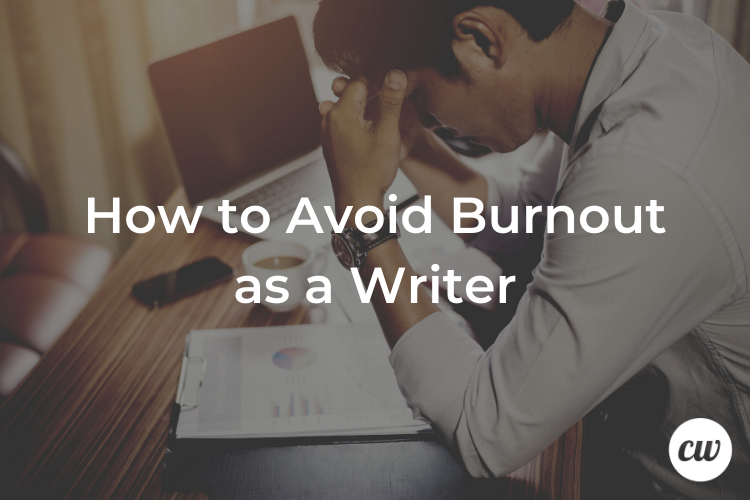
How to Avoid Burnout as a Writer
Are you a writer who’s dreading the thought of writing? This can be a cause for concern if you write content for clients who depend on your skills.
Everyday stresses in life can add pressure to the writing task at hand leaving you physically or mentally stressed. If so, you may have a case of writer’s burnout, which can leave you feeling exhausted, unmotivated, or even questioning your abilities as a writer.
Just what is writer’s burnout? What are the signs/symptoms you’ll want to be aware of and recognize? What can you do to find a healthy balance and prevent writer’s burnout?
Keep reading to find answers to these questions – ones that could help you continue to enjoy the many perks that go along with your writing career.
How to Recognize Writer’s Burnout
Answering the “what is writer’s burnout” question starts with understanding what symptoms and signs suggest you may be experiencing this type of burnout. Let’s break this down by physical, emotional, and behavioral signs associated with writer’s burnout.
Physical Signs
Writer’s burnout isn’t a purely emotional experience. It can affect you physically as well with symptoms that may include poor sleep habits along with:
- Headaches
- Fatigue
- An overall sick feeling without a clear source
Emotional Symptoms
Burnout for writers can take a toll emotionally as well. You might, for example, be uncharacteristically irritable or quick-tempered. Other emotional symptoms you may experience include:
- A general feeling of hopelessness that’s out of character for you
- Detachment or disengagement
- Depression and/or a lack of motivation
- A loss of passion for what you’re doing as a writer
Behavioral Signs
There are behavioral signs sometimes associated with writer’s burnout, too. Some of these issues could be potentially serious enough to impact all aspects of your life. Therefore, it’s best to act sooner rather than later if you are noticing:
- No longer associating with friends or having an active social life
- Alcohol and/or drug abuse or addiction
- A lack of concern or adherence to deadlines – intentionally because of a lack of commitment
Why Burnout Occurs
It’s generally a good thing as a writer to have a bunch of blog posts, social media content, or other projects to keep you busy. However, having an overloaded to-do list could contribute to burnout.
Even if you’re not overloaded as a writer, it’s possible to experience burnout for other reasons. For instance, you might get stuck in a rut – e.g., writing the same type of content for the same clients. This could leave you feeling as if you’re just doing the same thing over and over and not truly advancing your career or broadening your range.
You may also take on too much responsibility. Granted, this can sometimes be unintentional if you underestimate the full scope of your projects, but it’s not a good routine to get into.
Burnout for writers may also be the result of any of the following circumstances or factors:
- Work that’s too tedious or not challenging enough
- Not having enough downtime between projects
- Lack of support and/or clarity from clients
- Not having time to socialize or find a healthy work-life balance
- Insufficient compensation for writing tasks given what’s required
- An unwillingness to delegate when there’s the possibility of getting some help with certain writing projects
Writer’s Block vs. Writer’s Burnout
It’s easy to confuse writer’s block with writer’s burnout. However, these are not interchangeable terms – and it’s important to know the difference.
Simply put, writer’s block is generally defined as an inability to write even when there is a desire to do so. Writer’s burnout, on other hand, is a lack of desire to write, even when able to do so.
For example: Let’s say you normally do a series of healthcare blogs for a client and you’ve exhausted all popular topics. So, now you’re having a hard time coming up with a topic for your next blog post. This would be a type of writer’s block.
Now, let’s say a client gives you a specific topic to write about and you have a fairly good idea of how to put together the article they want. However, you feel physically or emotionally drained and you simply don’t feel like making the effort to write the article. This would fall under the writer’s burnout category.

7 Helpful Tips on Avoiding Burnout
With the right approach to writing and how you balance things out in your life, writing can be enjoyable and beneficial in a way that’s good for your body and mind.
Here are seven easy–to-embrace tips to help you achieve this goal:
1. Organize Your Writing Space
Make an effort to keep everything in your writing space clutter-free and organized. An uncluttered desk should help make it easier for you to complete your various writing tasks in a more orderly and time-efficient way.
2. Don’t Internalize Criticism
Whether it’s related to an in-depth article you spent weeks working on or a snappy social media post you cranked out quickly with confidence, every writer gets revision requests or feedback from clients that may come as a surprise or annoyance. Most of the time, however, such actions are meant to be constructive and beneficial.
3. Mix Things Up with Your Writing
While it’s understandable to rely on certain clients as a steady source of work and income, it’s just as important to mix things up to avoid burnout. By exploring a variety of topics, you’ll be able to keep things fresh, challenging, and stimulating as you write.
4. Learn to Say ‘No’
Avoid burnout by not putting too much on your plate at any given time. For instance, if you already have a few big projects to work on, don’t take on another one that will also take up a lot of your time to the point where you’re overwhelmed.
5. Communicate with Your Clients
Don’t assume your clients will always be aware of everything you are doing writing-wise, especially if you work with multiple clients regularly. If you find yourself getting overwhelmed, reach out to your clients and see if you can adjust deadlines and take other steps to ease your burden.
6. Be Mindful of Your Diet and Exercise Habits
What you eat and how much you exercise can affect you mentally and physically. Be sure to eat a healthy diet and find ways to get regular exercise in a way that’s fun for you and relaxing.
Yoga, daily walking, and swimming, for instance, are all forms of exercise that can boost natural “feel good” hormones called endorphins and help you naturally relax.
As for diet, avoid relying too much on jolts of caffeine to keep you alert as you write. You’ll be more mentally focused if you opt for healthy snacks and only drink caffeinated drinks like coffee in moderation.
You may also be able to avoid writer’s burnout by:
- Getting plenty of sleep
- Considering meditation or other relaxation techniques
- Eating fatty fish, blueberries, dark chocolate (also in moderation), and other brain-friendly foods that help with your focus while you write
7. Treat Yourself to Some Me Time
It’s not selfish to want some me time now and then. In fact, setting aside time for things you find enjoyable other than writing can be an effective way to maintain a healthy balance in your life. One way to do this is to firmly establish times when you’ll put writing on the back burner – e.g., only working on weekdays and saving weekends for yourself.
How to Overcome Burnout
Already experiencing signs and symptoms associated with writer’s burnout? Luckily, there are some things you can do to nip burnout in the bud. Here are some ideas that could help get you back on track in a way that’s good for your physical and emotional health:
- Take stock of your obligations: Look at your writing load to determine where you can make adjustments. This may mean contacting clients to shift things around.
- Give yourself mini-breaks: Take time throughout your day to go for walks, meditate, or simply relax between writing projects. You can also do this with more demanding projects.
- Establish a schedule: Take control back over your time to overcome writer’s burnout with a reasonable schedule. One way to do this is with time management apps and tools so you can keep better track of projects and space out your writing work.
- Explore other writing topics: If you feel stuck in a rut with your writing, get outside of your comfort zone and explore other topics – or pitch entirely new ideas to existing clients likely to be receptive to what you wish to write about.
- Set boundaries with clients: If you reach a point where clients are demanding too much of your time, let them know. Clearly establish reasonable boundaries with your availability in a way that benefits both you and your clients.
- Take extended weekends: There’s something to be said for enjoying a long, relaxing weekend when you’re starting to see signs of writer’s burnout. Both you and your clients will benefit when you regain your focus and sense of balance.
- Talk with your doctor: Make sure what you’re experiencing is really writer’s burnout by checking with your doctor. Plus, your doctor can give you more specific advice based on what physical or mental symptoms you may be experiencing.
Final Thoughts
Finding a healthy balance between your personal and professional life can make it much easier to produce awesome content in a way that’s good for you and your clients. Even simply having trusted friends and family members to talk to can help you remain motivated and relaxed as you write.
Like any other profession, writing can present some challenges when it’s what you do to earn a living. But it’s definitely worth the effort to find ways to enjoy the many benefits – both personally and professionally – that go along with this particular endeavor.
заказать бесплатную дебетовую карту
Ken is a freelance writer currently living in the Pittsburgh area of Pennsylvania. Born in California, his fondness for writing dates back to elementary school writing contests and led to positions on both high school and college newspapers. He earned a degree in Journalism and Communications from Point Park University and did work in data entry after college before transitioning to a full-time career as a freelance writer. While his areas of expertise are marketing and health-related content, Ken is a versatile writer and enjoys exploring and researching a variety of topics. When not busy knocking out articles, he likes to spend time with friends, go for walks, and discover new and exciting things about the world around him.




